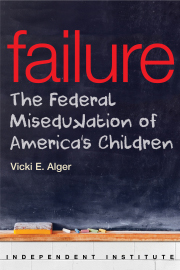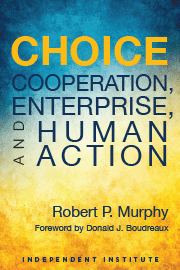K. Lloyd Billingsley • Thursday, September 8, 2022 •
More than 50 government officials across a dozen agencies, the Epoch Times reports, were involved in applying pressure to social media companies to censor users. Officials refusing to provide answers include Dr. Anthony Fauci, Biden’s chief medical adviser and director of the National Institute of Allergy and Infectious Diseases (NIAID) since 1984.
The case, Missouri et al v. Biden et al, is now in federal court under judge Terry Doughty. Jenin Younes of the New Civil Liberties Alliance, and an attorney for some of the plaintiffs, notes that Dr. Fauci had “demanded that specific individuals, including two of our clients, Jay Bhattacharya and Martin Kulldorff, be censored on social media.” Dr. Bhattacharya, of Stanford Medical School, and Dr. Kulldorff of Harvard, are co-authors of the Great Barrington Declaration, which took issue with Dr. Fauci on the issue of lockdowns.
"Us" vs. "Them"
Randall G. Holcombe • Wednesday, September 7, 2022 •
Humans have always lived and worked in groups and instinctively seek to cooperate with others in their group while viewing people in other groups with hostility. People in the same tribe work together for their common good. People in other tribes are potential predators or potential prey.
Those tribal instincts have stuck with us in modern times, often in socially harmful ways. Tribal instincts are the basis for racism and lay the foundations for nationalism. Modern societies have developed institutions to channel tribalism in non-destructive ways, such as organized sports. Rather than going to war with those of another tribe, we play games against them, giving us the satisfaction of battling another tribe while minimizing the death and destruction that accompanies other types of battles.
Electoral politics also plays on tribal instincts. We choose sides, and it is us against them. How sides are chosen is, at least partly, up to the politicians who are up for election.
The Baby and the Bathwater
Daniel B. Klein • Friday, September 2, 2022 •
“Don’t throw the baby out with the bathwater” is a saying that seems to go back to 1512. We use the saying to warn a friend against a syndrome of erring: In jettisoning something bad, first separate out the things that are good.
The hazard is especially great in the higher or deeper levels of thought and sentiment. All is fuzzy, and emotions impel us in ways little understood. When we feel in our heart something to be bad, we often have trouble delimiting that something. In our ire, we are vulnerable to summary expressions and caricatures. The pile is gathered imprecisely, too broadly. Sometimes we start down a road that leads to profound error. Precious things are forsaken.
Craig Eyermann • Friday, September 2, 2022 •
“The country got super rich and still managed to blow all its cash. That’s right America. We’re Nicolas Cage!”
That unique take on the growing problem of the U.S. government’s debt is contained in a YouTube video produced by Kite & Key Media. It’s entertaining. It’s educational. Enjoy!
K. Lloyd Billingsley • Thursday, September 1, 2022 •
Days after releasing a plan to phase out new gas-powered cars, Ben Zeisloft of the Daily Wire reports that California officials are “asking residents to avoid charging their electric vehicles in the interest of not overwhelming the power grid.”
According to Cornell University College of Engineering researchers, most electric vehicle owners charge their cars when they return from work in the evening, a time of peak demand.
The Inflation Reduction Act
Craig Eyermann • Thursday, September 1, 2022 •
When President Biden signed the badly misnamed Inflation Reduction Act, he claimed it would “achieve hundreds of billions in deficit reduction.” Several independent budget analysts reviewed the act’s newly enacted spending and tax increases and estimated its net impact on the growth of the national debt over the next 10 years. Here is a summary of their results:
- The Penn Wharton Budget Model anticipates it will reduce federal budget deficits by $264 billion.
- The Tax Foundation estimates the act will reduce the growth of the national debt by $324 billion.
- The Committee for a Responsible Federal Budget predicts $330 billion in overall national debt reduction.
Alvaro Vargas Llosa • Wednesday, August 31, 2022 •
The Inflation Reduction Act recently passed by the Senate is an act of economic and financial illiteracy one would tend to associate with Argentine politicians, not with the Parliament of the world´s only superpower. The Senate Majority Leader has characterized it as “a legislative feat of the 21st century.” One wonders what he was smoking. Or perhaps he was right and this will become a lasting paradigm of U.S. politicians’ inability to learn any of the lessons of the last hundred years.
Randall G. Holcombe • Tuesday, August 30, 2022 •
I’m reading a book on political economy that, early on, says “Consider, for example, inequalities in the distribution of income and wealth that result from the stark differences of economic opportunity and power between people in different socio-economic circumstances, particularly those relating to class, race and gender.” It happens to be this book, but that sentence is characteristic of contemporary thinking regarding economic issues. Inequality along racial and gender lines is a hot topic. I wrote about this in The Beacon recently, here, and here.
So, as that book says, let’s consider inequalities in the distribution of income and wealth.
Elias Amezuca • Monday, August 29, 2022 •
To the layperson, a license plate might be the most boring thing in the world besides the occasional unique background design or humorous custom lettering. But to an officer, a license plate is invaluable for its information. Beyond the make, model, and other relevant details about the car it’s attached to, when a license plate is run, we learn about the registered owner, their driving status, if the driver has a warrant, if the car has been reported stolen, and sometimes other officer alerts.
However, due to poor safeguards surrounding automated license plate reader (ALPR) technology, license plate-related issues can graduate regular traffic stops to more serious, potentially deadly encounters.
One year after the power plants closure, the results are clear
Paige Lambermont • Saturday, August 27, 2022 •
In recent years, a number of fully operational nuclear power plants with years and sometimes decades remaining in their permitted operating lives have been prematurely shuttered in the United States. Many of these closures have been politically motivated, coming on the heels of drawn out litigation from state governments and environmental groups who are not motivated by specific concerns, but by an overarching distrust of nuclear technology. Closures have also come as the result of shifting energy economics caused in no small part by high subsidies for wind and solar technologies, coupled with the refusal to treat nuclear power as green or zero carbon; despite the fact that nuclear power is less carbon intensive than solar, and has the same carbon intensity as wind, it is not treated as such.




























